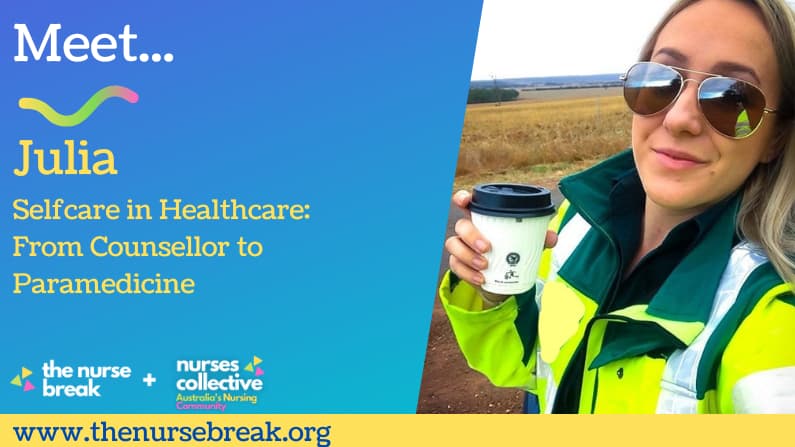Table of Contents
Meet Julia. From school counsellor to paramedicine. Selfcare in Healthcare
Being a Daughter of an ambo and a midwife; helping people has always flown through Julia’s veins. She started her career working in youth work, during which she had conducted research for a minor thesis at a community centre in the outlining suburbs of Victoria. Following this, she worked as a school counsellor for 5 years.
But she then felt the calling into the healthcare sector and was encouraged by her father and family friend to consider being a paramedic. Julia now works as an Ambulance Transport Attendant (ATA) and is finishing her Paramedicine studies part-time. Down the track, she has a passion to combine the previous career as a counsellor into the paramedical world and raise awareness about proactive mental health strategies in the healthcare sector.
What counselling taught me about surviving as a paramedic.
I was sitting with a colleague who was telling me about becoming a paramedic at 16. The numerous questions flooded my mind, curious and inquisitive surrounding what he’d seen and done. One questions stuck with me though. ‘How did he get through the last 40years as a paramedic without burning out?!’.
The reality of burnout and mental health is something that is ever increasing in the healthcare sector. The statistics of paramedic burnout is higher than ever, double that of other emergency service workers. It’s for this reason that I was so incredibly curious how my colleague had managed to stay in the job for 40 long years.
Sitting there he was telling me about how the job was a lot more of a “rough it and tough it” attitude. But in the same conversation, was telling me about how he used to do acting classes in high school and almost, in some aspects, treated his job as a paramedic in the same aspect. “I would go to work and put on my paramedic hat” alluding to it as a character in a play.
“When I’d be at work, I acted the part of a paramedic in the way I spoke and how I treated patients when in the actual fact I am quiet and introverted” he stated, telling me that this helped emotionally separate from what happened at work.
Having been a counsellor, now becoming a paramedic; I knew that there was a high degree of crossover with the self-preservation of emotions from exposure in the job. The amount of mental health-related patients paramedics are treating is beyond anything ever seen before in the job.
But not only are paramedics seeing more and more patients suffering from mental illness; but they, themselves are battling with it too. It was this that startled me and developed a sense of urgency within myself to begin my career on the best foot possible.
As a counsellor, we’re taught to both be able to develop a trusting rapport with our clients, whilst also simultaneously emotionally dissociating ourself from what we are exposed to. This is something that for me took time and good habits. I had to be really in tune with my own emotions, and be able to self reflect in order to stop myself from becoming too emotionally invested at work. Sounds simple but is quite hard when we, as healthcare workers, have a heroic do-gooder subconscious.
The first thing I learnt to do was emotionally and mentally leave work at work. When I walked out of my office, I mentally would put my counsellor hat into a box and not think or talk about what happened there. Secondly, I got myself a professional counselling supervisor; someone who I would discuss my cases with, who I would make myself see on a bi-monthly basis. Thirdly, I developed good coping mechanism; activities aimed at boosting moods and wove them into my routine on a weekly basis.
“Accept the things you cannot change, change the things you can, and have the wisdom to know the difference” The ability to cope comes down to balance in life. We can only take soo much on our “wagon” and when this “wagon” gets too heavy we need to take things off or make a bigger wagon. Regardless of how much we are exposed to or how emotionally draining our job is, our ability to cope will always come down to this simple notion of life balance.
So regardless of what job you have, your happiness is your own and your responsibility to take care of. Being proactive and using preventative measures is crucial to your mental health. You may feel okay now, you may be coping fine, but you will inevitably face something that will rock the boat. Having routines that are aimed at building a good coping mechanism will help prevent this burnout.
Take-home food for thought…
- Preventing burnout and ill mental health requires “preventative measures”…before the “big” job arises
- It’s sometimes okay to not be okay. Swallow your pride and be realistic about the fact that it is normal to feel down sometimes; especially if you’ve witnessed an emotionally draining case.
- Don’t sit and dwell in the negative; know when to pick yourself up and keep on keeping on
- Know your triggers! Be aware of the cases that may potentially affect you and talk to someone as soon as they arise.
- Laugh sometimes! Learn to develop a sense of humour and not take things soo seriously.
- Paramedic dark humour isn’t intended to be insensitive or rude… it’s just a way of realising that some things are too horrible and a little bit of humour helps to cope with it.
Are you an Aussie healthcare professional who would like to write about your area of speciality or other nursing/health related content then please email Jackson at thenursebreak@gmail.com to discuss further or check out the Write for TNB Info Page.







You must be logged in to post a comment.